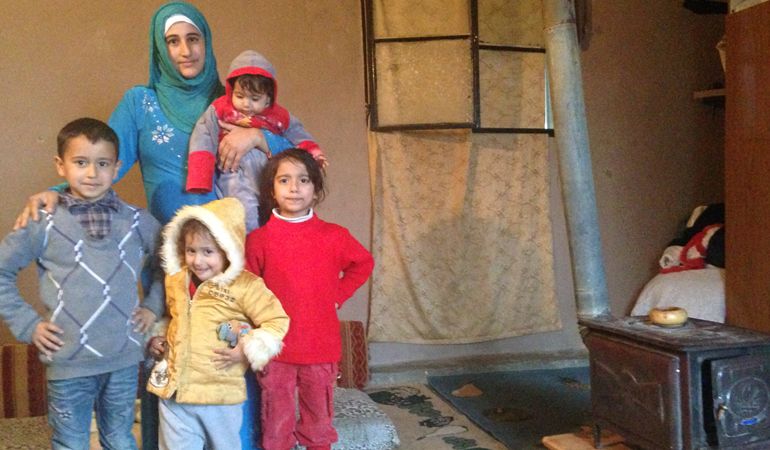Syrian refugees in Lebanon: The Mattar family
In a series of profiles of displaced Syrian families, Al Jazeera explores the ongoing costs of the country’s civil war.

Loubiyeh, Lebanon – As the war in Syria enters its fifth year with no end in sight, more than one million Syrians have fled their country to neighbouring Lebanon, seeking refuge wherever they can find it.
Today, Lebanon has every shade of Syrian refugee: from those living in temporary informal settlements, unsure of whether they will be forced to move at a moment’s notice, to the more privileged ones who have to jump through impossible hoops to relocate their families and businesses.
There are registered refugees, unregistered refugees, economic refugees and labourers who have moved their families over.
|
|
Over the past four years, Syrians have borne the brunt of Lebanon’s political instability, poor infrastructure and sectarian tensions.
Countless stories have emerged to highlight the discriminatory measures taken against Syrian refugees, the imposition of curfews, poor housing, physical and verbal attacks by local communities, and a lack of adequate aid from non-governmental organisations.
The long-term effects of their plight, meanwhile, are slowly emerging. Thousands of children are not attending school, paving the way for an illiterate generation.
Families are unsure of when, or if, they will ever be able to return to Syria, forcing them to look at Lebanon as their permanent home despite having very limited rights.
At the same time, the Lebanese are getting frustrated with the strain that 1.5 million refugees are putting on their economy and infrastructure, escalating tensions between the two communities.
RELATED: You probably won’t read this piece about Syria
In the small, sleepy village of Loubiyeh, just south of Sidon, one family of Syrian refugees told Al Jazeera that they are grappling with all of these impacts, while also facing the trauma of what is happening to their family back in Syria.
Sukkara Mattar, 24, fled her village of Saan al-Aswad in Homs to Lebanon in March of 2011, as soon as the Syrian uprising began. She left with her two children, two-year-old Izza and one-year-old Lana, and her husband, 35-year-old Kasr.
“We didn’t see anything. We didn’t take part in anything. We just left,” Sukkara told Al Jazeera, sitting outside the two-room house she has been living in for the last four years. “Once we heard of attacks happening in the neighbouring towns, we packed and left.”
Every time we go to the neighbouring town, we get abused; people insult us, tell us to go back to Syria. Kids throw stones at us... It's not easy to deal with.
Four years later, she has had two more children, registered her family members as refugees, and is struggling to survive day-to-day.
Meanwhile, just over a year ago, six of her family members were kidnapped from their home in Syria by armed men, and Sukkara does not know whether they are dead or alive.
“The men came into our home, ransacked the place, stole everything and then burned it to the ground,” she said. “They kidnapped my parents, two of my brothers and two sisters. We have been trying since then to get any information on their well-being, but we know nothing.
“I spoke to my father hours before it happened,” she added. “The last thing he said to me was, ‘Don’t come back to Syria. Take care of yourself and your brother.'”
INFOGRAPHIC: Syria: A home no more
Her brother returned to Syria a few months ago to seek information on their situation, but came up with nothing.
In Lebanon, Sukkara considers her family to be better off than other refugees “because the neighbourhood is good to us and we have a proper roof over our heads”. Still, they have not been immune to the daily abuses refugees face in the country.
“Every time we go to the neighbouring town, we get abused; people insult us, tell us to go back to Syria. Kids throw stones at us… It’s not easy to deal with,” she told Al Jazeera, noting she has no friends in the area and barely leaves the compound of her home. “You don’t know who you’re living with, where they come from, what they’re doing.”
Her children, now old enough to go to school, spend their days playing with the neighbourhood kids.
“They don’t go to school,” Kasr explained. “I’m afraid for them. I’m afraid they’ll be picked on or attacked. I’d
|
|
rather keep them at home.”
Izza, 6, and Lana, 5, say they are desperate to go to school. “I want to learn,” Izza said, while Lana added that she wanted to make new friends her own age.
However, the family receives just $19 per person per month from the United Nations, while enrolling them in school would cost $70 per child per month. “We just can’t afford it,” Sukkara said.
“We were comfortable in Syria; we wanted for nothing,” she added. “Here, yes we are living, but we are living to survive… May God punish all of those responsible for destroying Syria.”